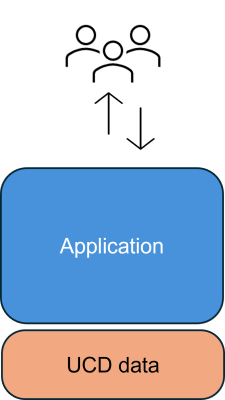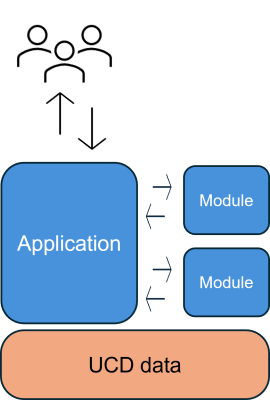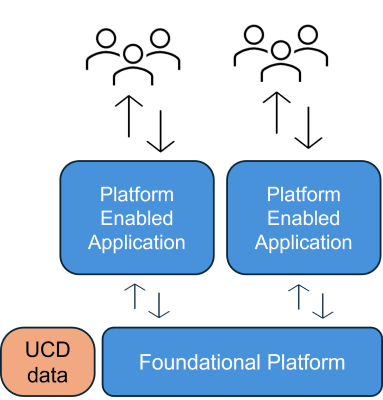Applications are digital solutions / systems that provides functionality to UCD’s community, typically accessed through a web browser, mobile device, or desktop, or that provides functionality or capabilities to other applications.
Applications include
- on-premise hosting and cloud-based services
- bespoke developments and standard packaged solutions
- internally managed or externally managed by third parties
- subscription-based or perpetually licensed models
- paid, free, and open-source options
Applications depend upon an underpinning technical products - typically a cloud service or a software package - to function, and are often be tailored to fit UCD requirements.
As part of any application data gathering exercises and/or technical assessments, we’ll request information on these underpinning technical products.
University-wide vs Local Deployments
Applications may be deployed and managed as
- University wide - implemented for use across multiple schools or units
- Local - implemented for use in one school or unit
Types/Models of Application
Applications broadly fall into 3 models-
- Basic Applications
- Applications with Modules
- Foundational Platforms with Platform-Enabled Applications
| Basic Applications |
Applications with Modules |
Foundational Platforms & Platform-Enabled Applications |
| To access/update UCD data, users directly interact with the Application. |
Extra functionality is provided through additional modules, but to access/update UCD data, users directly interact with the Application. |
To access/update information, users directly interact with the platform enabled application. The Foundational Platform provides a pre-integrated ecosystem of applications (e.g. Microsoft 365), or provide the capability to build new applications (e.g. Salesforce). |
 |
 |
 |
| The Application must be registered. |
The Application and the modules must be registered. |
The Platform-Enabled-Applications and the Foundational Platform must be registered. |
Naming Conventions
Applications should be described using a name that is understood across UCD
The name may match the underpinning products proprietary name - e.g. a particular cloud service or a software package;
- this is more likely where the application is used largely “as delivered” by the vendor
Or can be intentionally distinct from products proprietary name;
- this is more likely where application has been significantly adapted / reflecting the unique UCD instance
- to create user-friendly name or incorporate UCD branding
- avoid promoting proprietary brands / vendors internally
- provide flexibility if the underlying product changes
- obfuscates the underpinning technical product, to enhance clarity to non-technical stakeholders
Is this an Application?
| Use Case |
Is this an Application? |
Rationale |
| Internally managed server running a website |
Yes |
This is viewed as a bespoke application The underlying technical components (e.g. Apache HTTP Server, Tomcat, .NET) should be captured |
| Website running on a web hosting platform (such as Plesk, Wex, Squarespace) |
Yes |
This is viewed as a COTS application The underlying technical component - the web hosting platform (e.g. Plesk, Wex, Squarepace) should be captured |
| Website running on a UCD’s T4 CMS Platform |
No |
This is viewed as data/content The application (TerminalFour CMS) is already been captured as university-wide application |
| Customised Google/O365 form - enabling a business process or collects data that supports business decision making |
Yes |
This is viewed as a bespoke application The underlying technical component (e.g. Google Forms or O365 Forms) should be captured |
| Customised Google/Excel spreadsheet that holds data that supports business decision making |
No |
This is seen as data/content |
| Google/Teams site that is used for file sharing, communication, project management? |
No |
This is seen as data/content |
| I’m running the same software or cloud service as another school/college/unit - but it's not listed in the Application Catalogue |
Yes |
Where schools are independently operating their own instances of an application (e.g. separate agreements, contracts, licences, etc…) each should be captured |
| It’s free (or UCD don’t pay for it) |
Yes |
All applications, regardless of cost, must be registered |
| It’s just used by just one person and/or on one machine |
Yes |
All applications, regardless of scale, if they are being used to enable business, teaching or research activities, must be registered |
| It’s used by students for Teaching or Research |
Yes |
All applications, regardless of scale, if they are being used to enable business, teaching or research activities, must be registered. |
| It’s a server running bespoke research software (possible installed in the UCD Data Centre) |
Yes |
The combined set of technical components (server, storage, networking, etc..) together form an ‘application’ |
| It’s not used for Business, Teaching or Research, isn’t paid for by UCD, and doesn’t store or process any UCD data |
Maybe |
Such software probably doesn't need to be registered, but check with the EA team. |
| Operating Systems, Device Drivers, Utility/Configuration Software, Web browsers, installed on my device? |
No |
System software (packages installed that make your laptop/desktop/server/device usable) don’t need to be registered. |
UCD IT Services
Computer Centre, University College Dublin, Belfield, Dublin 4, Ireland.Contact us via the UCD IT Support Hub: www.ucd.ie/ithelp